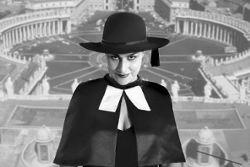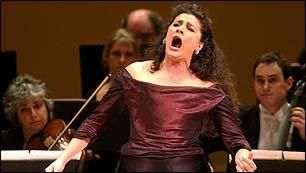Cecilia Bartoli's New Disc
Cecilia Bartoli, Opera Proibita, Les Musiciens du Louvre, Marc Minkowski |
Bartoli has chosen arias from oratorios performed in 18th-century Rome, during a papal ban on staged operas: five pieces (only a third of the CD) from works by Handel, with six by Alessandro Scarlatti and four by Antonio Caldara, both of whom were giant names in the Baroque period although they are much less known now. These pieces were written for singers at the height of their technical skills, and the mind boggles at the achievement of Minkowski's instrumentals and La Bartoli alike especially in the blindingly fast arias. I, for one, wish that the sweetness of tone in the slower arias could find some expression even in the fast ones. Every once in a while, the barrage of tiny notes comes to a temporary halt in those fast pieces, and the sound is fidgety and nervous with a tense vibrato that borders on the ugly. It's true that Baroque music in many ways is all about Affekt, setting a single emotional tone in each work or movement, colors that Minkowski's group and Bartoli do quite effectively. What Bartoli really does well is ornamentation, which is the whole point of repeating the A section in a da capo. Even if some of the ornaments Bartoli sings were written out by the composers, she understands the theatrical nature of these alterations.
Does the stile Bartoli come at a price? Well, as Jens joked the other day, the chief advantage of this CD is that we are only hearing, and not seeing, the singer. As far as collections of performing tics go, La Bartoli may be the champion, often reeling off those impressive runs with one half-closed eye and her mouth skewed to one side. Even on a purely auditory level, there are mannerisms. None of this really matters, however, since the product is so polished and near-perfect. This is singing that is both intelligent and technically skilled, a rare combination. Some credit for the ingenious program should go to Bartoli's music consultant, Claudio Osele (long-time collaborator with Bartoli, also described as "friend" and "companion"), who is credited for the critical editions of all of the Caldara arias and most of the Scarlatti ones. Once again, the act of editing music, making transcriptions and modern performing editions, makes possible the revival of forgotten works. In spite of my best efforts at explaining this, Alex Ross persists in misrepresenting Lionel Sawkins's lawsuit against Hyperion in The New Yorker. I feel bad for Hyperion, too, but what Lionel did with Lalande and what Osele has done with Caldara and Scarlatti, realizing modern editions from 18th-century manuscripts, is important work. In fact, the recordings needed such work just to be made, but it does not mean that the editor somehow owns the rights to the work itself, just the "translation" into modern musical language. Anyone else is free to make another edition, just not to use another person's work unfairly, which is what Hyperion did.
 At the same time, I cannot help but point out that the idea for Bartoli's CD is contained, in kernel form, in Lorraine Hunt Lieberson's fabulous CD of Handel arias (top CD of 2004 according to Alex Ross). One of the things that LHL chose for that program, with the Orchestra of the Age of Enlightenment, was Handel's cantata La Lucretia, situated historically thus by Richard Wigmore in the liner notes:
At the same time, I cannot help but point out that the idea for Bartoli's CD is contained, in kernel form, in Lorraine Hunt Lieberson's fabulous CD of Handel arias (top CD of 2004 according to Alex Ross). One of the things that LHL chose for that program, with the Orchestra of the Age of Enlightenment, was Handel's cantata La Lucretia, situated historically thus by Richard Wigmore in the liner notes:Taking up an invitation from the Duke of Tuscany, he arrived in Florence in the autumn of 1706, and by January 1707 had moved on to Rome. A papal decree had proscribed opera as frivolous and immoral. The deprived Roman aristocracy consoled themselves with private performances of dramatic chamber cantatas, in effect miniature operas for one or two voices.And there you have it. La Lucretia was probably composed around 1708, for the Sunday meetings of Marquis Ruspoli in Rome. Given the time frames, it seems unlikely that Osele and Bartoli got their idea from LHL's CD, but it does show that the idea itself is not all that extraordinary, although the execution certainly is. Brava, Cecilia!
In addition to our thoughts on La Bartoli's new disc, here is a sampling of what critics around the world have been writing. First, from Jean-Louis Validire's interview (Cecilia Bartoli : «Nul ne peut arrêter l'art», September 11) for Le Figaro (my translation):
Your album cover evokes the famous scene in Fellini's La Dolce Vita where Anita Ekberg climbs into the Trevi Fountain at night in Rome. What's that all about?From Nicolas Blanmont's article (Cecilia et les interdits de Rome, September 12) for La Libre Belgique (my translation):
You could draw a parallel between the 18th century in Rome, when the Vatican wanted to ban a type of art, and the postwar years when Pius XII condemned night life. When the pope died, there was an explosion of joie de vivre illustrated by Fellini's film that the Vatican still wanted to ban. Nevertheless, it was meant only to show the fragility and emptiness of society. Anita Ekberg is a Baroque heroine. The water coursing over her body is like the ocean that no one can stop. Just as no one can stop art. That is what the cover is meant to symbolize.
Handel borrowed an instrumental sarabande from his Hamburg opera Almira, to be reused in his oratorio Il Trionfo del tempo e del disinganno as the sublime air "Lascia la spina," before recycling it several years later in London as the Almirena's lamento in Rinaldo ("Lascia ch'io pianga"). [...] It was precisely that oratorio by Handel, premiered in Rome in 1707, that got Cecilia Bartoli interested in this repertoire that led her to make her fourth theme album, after one on Vivaldi opera arias (which sold more than 500,000 copies, which is rare in the classical world) and those on Gluck and Salieri. The Italian singer had the chance to sing in the work during a staged production given at the Zurich Oper under the baton of Marc Minkowski. Naturally, she called on the French conductor and his Musiciens du Louvre to accompany her in this recording.From Jacques Schmitt's article (Un castrat nommé Bartoli, September 10) for ResMusica (my translation):
For lack of technical ability, no one among the early music singers of today has yet dared take on these arias that made the fame of the castrati. With Cecilia Bartoli, they now have a voice. A vocal body. In Opera Proibita, the mezzo is exploring the music of Caldara, Scarlatti, and Handel, who were in residence in Rome at a moment in history when the Vatican of Clement XI banned all theater and when woman were forbidden to appear on stage as actors or singers. But, more than throwing her weight against this scandalous papal machismo, the mezzo exhumes from musical archives a myriad of surprising works, rich in teaching about that period's music.
 Schmitt has also published an excellent interview with Bartoli. From vilaine fille Marion Lignana Rosenberg's article (Fast Chat: Cecilia Bartoli, October 2) for Newsday:
Schmitt has also published an excellent interview with Bartoli. From vilaine fille Marion Lignana Rosenberg's article (Fast Chat: Cecilia Bartoli, October 2) for Newsday:You haven't sung at the Met since 1998. Will you be back soon?Vilaine Fille also has a nice, long post on the album, including a translation of an interview from Le Monde. Sarah Noble stops obsessing about Yvonne Kenny long enough to listen to the Bartoli CD (Opera Proibita, September 24) and praises it up and down at Prima la musica, poi le parole before adding:
I've met with Peter Gelb, the incoming general manager, and we're talking about the 2008 season.
Some critics say that your repertoire is too limited and arcane.
My response is that audiences love this music, even young audiences who come to my concerts and buy millions of recordings. Vivaldi, Gluck - their works are jewels! Whoever can't feel this is a limited person.
What will be your focus in coming years: opera, concerts, chamber music?
Everything! I'd like to perform Monteverdi and Renaissance music, but also go back to Romantic works. I've never stopped singing Rossini. Having Rossini in your repertoire means that your voice stays agile and flexible. And I'm not against modern music, though nowadays composers tend to write without consideration for singers - unlike old-time composers, who tried to show specific voices to their best advantage.
But - and I'll bet you didn't hear that coming - having said all this, I do hope fervently that Cecilia's next album will be totally unlike this. It's gorgeous, and I've made it clear above that I love it. But I also know that she can do other things, and it's about time we heard them. The fact is that of all Cecilia's solo albums (and I own every single one) my own personal favourite is perhaps the least 'Cecilia' of them all: Chant d'Amour. French art song of the nineteenth and - gasp - (early)twentieth centuries. Almost nothing on the CD is the sort of repertoire we expect from Cecilia - neither was it when she recorded it - but she makes it all absolutely her own.Finally, another interview by Jessica Duchen (Rome, Sweet Rome, September 16), in Rome, as a lead-up to Bartoli's recital at the Barbican in London in December (after she comes to the United States, including Carnegie Hall and here at the Kennedy Center):
There'd probably be a touch of genius about anyone who could make me rave about an evening of Italian baroque opera accompanied by period instruments. Normally I run a mile from such things, probably because I had it rammed down my throat ad nauseam at university. The other night, however, I was on the edge of my seat all the way through and afterwards was almost ready to go and hug Marc Minkowski and all his Musiciens du Louvre as well. I even elected, later on, to listen to a recording of a counter-tenor (Scholl, naturally), and liked it when I did. This is getting serious!Welcome to the Early Music Club, Jessica!





















































No comments:
Post a Comment